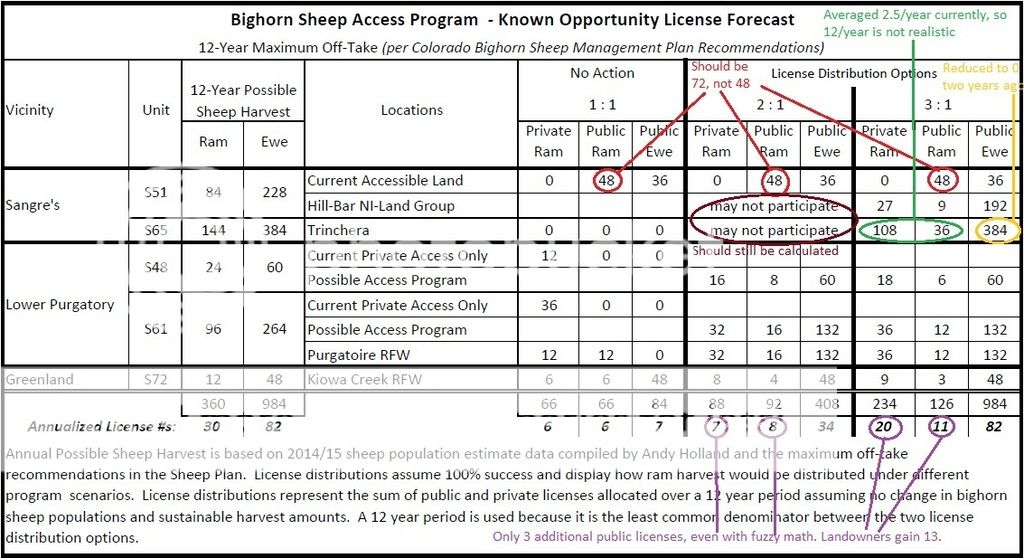The updated access proposal and meeting agenda have now been posted on the Commission website. The topic is scheduled for 2:15pm July 9, although it may begin earlier depending on how quickly other agenda topics are completed.
The only major revision made from the draft presented at the May meeting is that the private and public seasons are no longer required to be at the same time of year. The original proposal said that private hunters would hunt the first year, and public hunters would hunt the subsequent 2 or 3 years, depending on whether the ranch chose a 2/1 or 3/1 allocation, and the season dates for both would be the same.
The new proposal says that both public and private hunts may occur the same year, but the public hunts must be of equal or greater length than the private hunts, and they must occur first. So we can now have a situation where the public gets an August or September season and the private hunters get a November rut hunt.
The Commission asked CPW staff at the May meeting if they could consider imposing the 5 year public draw waiting period on successful private license holders, just as is imposed on successful public license holders. They said that they would consider it, but ultimately it was not included in the current proposal.
The "Known Opportunity License Forecast" presented on the last page of the proposal is so askew I look forward to seeing whether staff can present it to the Commission with a straight face. The basis of their numbers is "Maximum off-take rate per Colorado Bighorn Sheep Management Plan recommendations." Which means to say that their numbers in no way reflect what will actually be issued.
The management plan recommendations call for an annual ram off-take of 2%-5% of the total population. In reality, annual off-take statewide has averaged around 2% for the last several years. Annual off-take on Trinchera Ranch has been approximately 0.6% (2.5 rams per year), so for them to say that we might now get 12 ram licenses per year is absurd, especially given that the ranch, not CPW staff, will have final say in how many licenses are issued. And the 32 ewe licenses per year on Trinchera is even more absurd given that in 2014 the ranch asked for and received a reduction in ewe licenses from 10 per year to zero.
The table shows a current S51 public allocation of 4 ram licenses a year (48 over 12 years), yet the actual allocation is 6 ram licenses per year (72 over 12 years).
They chose to not calculate some of the ranches at a 2/1 allocation because they "may not participate" at that level. This makes the gain in licenses at 3/1 appear greater than it is.

The only major revision made from the draft presented at the May meeting is that the private and public seasons are no longer required to be at the same time of year. The original proposal said that private hunters would hunt the first year, and public hunters would hunt the subsequent 2 or 3 years, depending on whether the ranch chose a 2/1 or 3/1 allocation, and the season dates for both would be the same.
The new proposal says that both public and private hunts may occur the same year, but the public hunts must be of equal or greater length than the private hunts, and they must occur first. So we can now have a situation where the public gets an August or September season and the private hunters get a November rut hunt.
The Commission asked CPW staff at the May meeting if they could consider imposing the 5 year public draw waiting period on successful private license holders, just as is imposed on successful public license holders. They said that they would consider it, but ultimately it was not included in the current proposal.
The "Known Opportunity License Forecast" presented on the last page of the proposal is so askew I look forward to seeing whether staff can present it to the Commission with a straight face. The basis of their numbers is "Maximum off-take rate per Colorado Bighorn Sheep Management Plan recommendations." Which means to say that their numbers in no way reflect what will actually be issued.
The management plan recommendations call for an annual ram off-take of 2%-5% of the total population. In reality, annual off-take statewide has averaged around 2% for the last several years. Annual off-take on Trinchera Ranch has been approximately 0.6% (2.5 rams per year), so for them to say that we might now get 12 ram licenses per year is absurd, especially given that the ranch, not CPW staff, will have final say in how many licenses are issued. And the 32 ewe licenses per year on Trinchera is even more absurd given that in 2014 the ranch asked for and received a reduction in ewe licenses from 10 per year to zero.
The table shows a current S51 public allocation of 4 ram licenses a year (48 over 12 years), yet the actual allocation is 6 ram licenses per year (72 over 12 years).
They chose to not calculate some of the ranches at a 2/1 allocation because they "may not participate" at that level. This makes the gain in licenses at 3/1 appear greater than it is.




